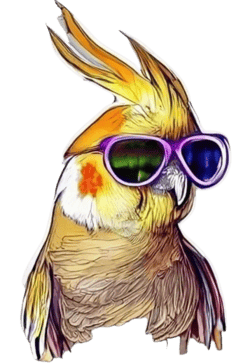Can Cockatiels Eat Chia Seeds: A Comprehensive Look on Avian Dietary Practices
“Sharing is caring”, as the old adage goes, is true even when it comes to our feathered pals. But it’s crucial to know what our birdie buddies can share from our pantry.
Introduction
G’day mate and welcome to this comprehensive guide. Today, we talk about a bird that would even make the Aussie’s heart skip a thrum—cockatiels. Sporting a glamorous crest and a personality that’s music to the ears, cockatiels are like the cherries atop our everyday sundae. They add a touch of sweet delight to the hustle and bustle of life.
Speaking of sweet delights and sundae toppings, nutrition is a massive talking point when it comes to cockatiels. You see, tending to the diet of a cockatiel isn’t as simple as hurling a handful of birdseed into a bowl. It’s like composing a symphony, a balance of notes—seeds here, fruits there, a sprinkle of veggies, and voila, you’ve got a nutritional masterpiece.
And today, we’re tuning our instruments to play the melody of chia seeds.
Nutritional Content of Chia Seeds for Cockatiels
Imagine if a tiny little object of about a couple of millimeters held a treasure trove of nutrition. Sounds like fantasy? Well, welcome to the realm of chia seeds! These tiny seeds are chock-a-block with essential nutrients such as Omega-3 fatty acids, calcium, phosphorus, magnesium, and plenty of fiber.
So what does this mean for cockatiels? Let’s not forget that they are little athletes singing and flying around all day. Hence, they have a high need for energy, and the healthy fats found in chia seeds can provide that.
Omega-3 fatty acids are great for keeping their plumage shiny and their skin healthy. The high calcium content is excellent news for female cockatiels who lay eggs. Plus, the fiber in chia seeds can aid in digestion.
Expert Opinions on Feeding Chia Seeds to Cockatiels
Now, I’m a firm believer in trusting science and the experts. When diving into the expert opinions on this topic, veterinarians and avian nutritionists confirm that chia seeds are safe for cockatiels when given in moderation.
Studies have shown that these superfoods can bring about visible improvements in the glossiness of a bird’s feather and their overall vitality. Still, experts caution against letting chia seeds take over the food bowl. Just like humans, cockatiels need a balanced diet to key to keep their choo-choo health train on track.
Practical Aspects of Feeding Chia Seeds to Cockatiels
So, how much is too much? That’s the million-dollar question! Ideally, chia seeds should comprise no more than 10% of the dietary mix for your bird.
These mighty seeds can be served up raw or sprouted. However, I’m an advocate for soaking them before serving. The seeds expand and become easier to handle, reducing the risk of choking.
But remember, our feathered mates have different palates. What’s appealing to one bird may not be to the other. It’s not uncommon for a cockatiel to turn its beak up at chia seeds initially. If this happens, try mixing these seeds in other foods they enjoy.
Real-life Cockatiel Owners’ Experiences and Stories
There’s a whole world of bird-parents out there who have shared their adventures with chia seeds. Some have noticed their cockatiels showing off glossier feathers and chirping with renewed energy after introducing chia seeds into their diets. But then there are the few who faced the great cockatiel rebellion with flung foods and protest squawks.
Such dichotomy of experiences serves to remind us that, just like us humans, each bird is unique. What works for one might be a failure for another. The secret is to tailor their diets as per their individual whims and fancies.
Alternatives to Chia Seeds in Cockatiel Diet
No kiddin’, chia seeds are great. But they ain’t the only superhero food in the avian world. Let’s not forget about flax seeds, sesame seeds, and the humble sunflower seeds, all rich in nutrients and loved by the cockatiel community.
Also consider topping up your bird’s diet with fresh fruits, vegetables, and the occasional serving of cooked grains. The spice of life is variety, and the same holds for a cockatiel’s diet.
Conclusion
Well, buckle my swash; we’ve talked about quite a bit, haven’t we? The humble chia seeds, the not-so-humble nutritional powerhouse, sure seem to be a good feed for your cockatiel. But, remember, moderation is key.
Listen to your little buddy, observe their behavior, and adjust the diet accordingly. Don’t just wing it – remember, the secret to a healthy, happy bird is balance and variety!
Curious about whether cockatiels can eat chicken? Check out our article on “Can Cockatiels Eat Chicken?” for insights into what proteins are suitable for your feathered friend’s diet.
FAQs
- Can chia seeds cause diarrhea or other digestive issues in cockatiels?
According to experts, too many chia seeds could potentially cause mild digestive discomfort in cockatiels, but this is rare. - Should chia seeds be given daily or occasionally to cockatiels?
Moderation is key. While chia seeds are safe, they should be a part of a balanced and varied diet, not the entire meal. - What should I do if my cockatiel refuses to eat chia seeds?
If your cockatiel gives the old “cold shoulder” to chia seeds, try mixing them with other foods. If your bird is steadfast in its refusal, don’t fret; plenty of other nutritious choices are available! - Can I mix chia seeds with other food items for my cockatiel?
Absolutely! Mixing chia seeds with other items can add a nutritional boost to the meal and make it more appealing for your bird.

About Me
I’m Kamran, a co-founder and content creator at cockatielhq.com. With 8+ years in the world of avian enthusiasts, I’ve gained extensive knowledge in caring for birds. From egg-laying and mating to cohabitation with other birds, dietary needs, nurturing, and breeding, I’m here at cockatielhq.com to share valuable insights for your avian companions.








One Comment